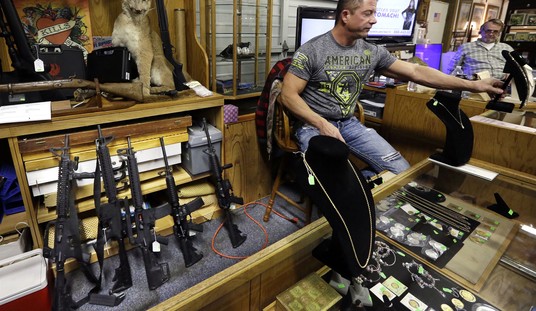The White Settlement shooting did a number on anti-gunners. After all, here was a mass shooting that they really couldn’t manage to put pro-gun activists and lawmakers on their heels over. Rather than pressuring us to justify how the killer got his gun or how we need to ban “assault shotguns” or whatever they would have decided to call them, we could point out to the relatively low loss of life and the quick actions by several of the church security members.
However, there are those who still seem to believe that we’re off our rocker by pointing this out.
No policy or set of policies can eliminate malevolent acts like this. But you don’t have to look very hard into the White Settlement story to find areas of, let’s say, potential improvement. Can the mental health and criminal justice systems be better engineered to intervene with people like the shooter before it’s too late? Are there ways to prevent people with similar problems from legally obtaining a firearm? To ask is to answer.
You will be surprised to learn, then, that the White Settlement shooting is being portrayed as something of a happy story—or at least, a policy success. That’s because the shooter was gunned down relatively quickly, and because the man who killed the shooter was carrying his gun thanks to an act of the Texas Legislature. After a year of horrific mass shootings in Texas like the ones in El Paso and Midland–Odessa in August, after which state lawmakers had to shuffle their feet and wait for attention to fade—or in Lieutenant Governor Dan Patrick’s case, to call for universal background checks before quietly retreating—they finally had a reason to take a victory lap.
Clearly, the writer doesn’t feel the same way as I do on the topic.
However, look at what he thinks we should focus on. Remember when people flew off the handle at President Trump suggesting mental health was an issue in these incidents? Now, suddenly, it seems to be a point we should discuss.
The problem here is that people like the writer in question tend to look at mass shootings and want to craft legislation based on the most recent shooting. They aren’t looking at solutions to the overall bigger problem of mass shootings and attempted mass shootings.
More importantly, they’re only focused on how we can keep a gun out of the potential shooter’s hands.
The truth is, that’s probably not going to happen. After all, far too many of these shooters have absolutely nothing in their background checks to prevent them from buying a gun. Even the Parkland killer, despite the plethora of police encounters he had, possessed a clean background check when he went to buy his gun.
While the writer wants to focus on this one incident, we have a whole slew of other cases where none of his proposals would have done a damn bit of good.
Yet we know what did work here. That was an armed citizen working with his church to prevent these kinds of tragedies. While it was still a tragedy–the loss of any innocent life is tragic, as it should be–it’s not the tragedy it could have been.
The writer decries people like Lt. Governor Dan Patrick focusing on how policies he backed actually worked, arguing that Patrick is politicizing the tragedy, but the truth is that anti-gunners have politicized every mass shooting since Columbine. Time and time again, pro-gun voices are expected to maintain silence while anti-gun advocates flood the airwaves with gun control rhetoric, all so we can then have to unmake the anti-gun strawmen that have been constructed.
However, anti-gun rhetoric either includes measures that wouldn’t have stopped the mass shooting in question–arguing for universal background checks after Parkland, Orlando, Las Vegas, and countless others–or else are so hyperspecific to this incident that they’d do nothing to prevent the broader problem.
So yeah, we’re politicizing tragedies. We don’t have much choice.
But we’re damn sure going to politicize our successes, and anyone who can’t see White Settlement as a pro-gun success has their head in the sand.








